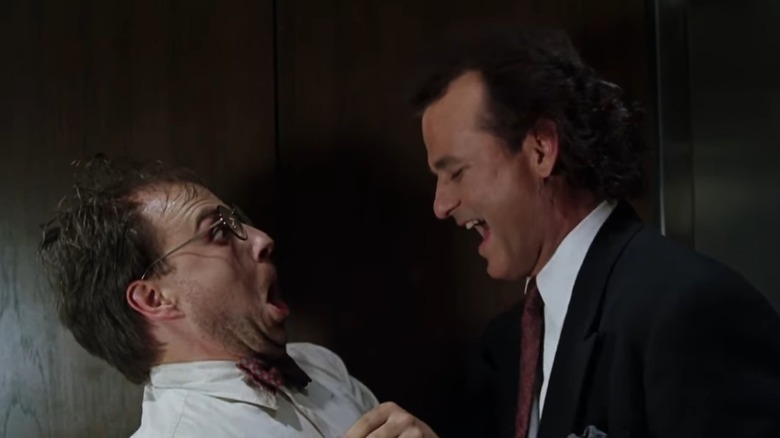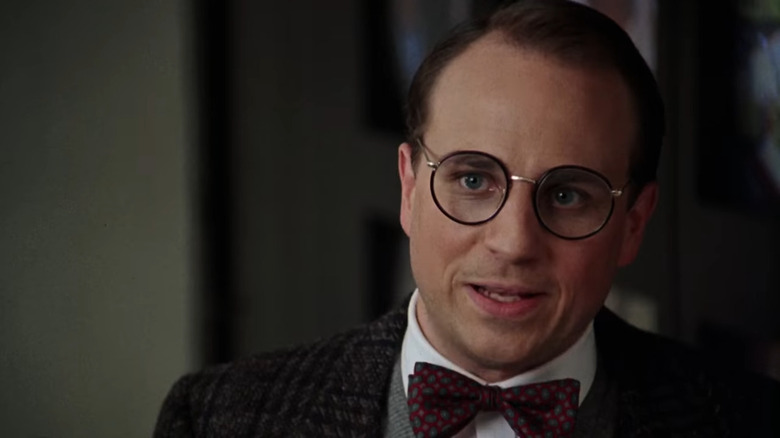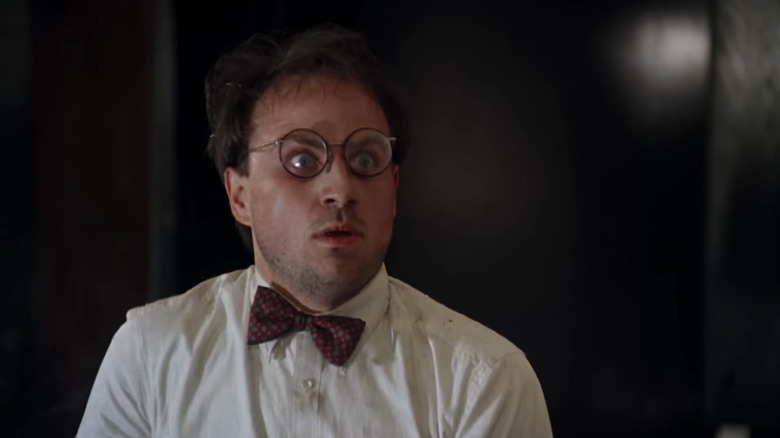Bobcat Goldthwait Bore The Brunt Of Bill Murray's Improv On Scrooged
Richard Donner's 1988 film "Scrooged" was a modern rendition of Charles Dickens' "A Christmas Carol," updated for the yuppie set. The Reagan generation's Ebenezer Scrooge was Frank Cross (Bill Murray), a vain, bitter, ratings-hungry TV executive who believes in sensationalism over quality; he wants to air a Christmas special called "The Night the Reindeer Died" with Lee Majors in an action hero role. Gentleness and tenderness are not in his vocabulary, and he happily fires employees on Christmas Eve. Unlike Scrooge, however, Cross is not a grump or a curmudgeon. Frank is a flip, winking, narcissist who reacts to the world with annoyed sarcasm rather than with a dismissive "Humbug!"
Other updates to Dickens included a Ghost of Christmas Past (David Johanson, a.k.a. Buster Poindexter) that was a cigar-smoking cab driver, and a Ghost of Christmas Present (Carol Kane) who punches Frank repeatedly in the face. The Bob Cratchit character from the original story was bifurcated into two characters. There was Frank's assistant Grace (Alfre Woodard) who had to beg to get time off for Christmas, and Eliot Loudermilk (Bobcat Goldthwait), a long-suffering employee who was fired on Christmas Eve for the crime of questioning Frank's questionable decisions.
Late in the film — and this is certainly not from Dickens — Eliot, having snapped, returns to work with a shotgun with every intention of murdering Frank for being a horrible human being. Eliot, however, catches Frank right when he's in the middle of his ordeal with the Ghost of Christmas Future and finds his intended victim a changed man. Eliot is not only rehired on the spot but given bonuses and benefits, he didn't even think to ask for.
Eliot Loudermilk
In a 2018 career retrospective for Yahoo!, Bobcat Goldthwait recalls working on the film, and what it was like co-starring with Bill Murray. Goldthwait had been a rising star in the stand-up comedy world throughout the 1980s, and became a recognizable comedy star thanks to the popularity of the "Police Academy" movies, as well as "One Crazy Summer" and "Burglar." Murray, meanwhile, had achieved enough success with 1984's "Ghostbusters" that he could afford to take four years off, only appearing briefly in the 1986 film "Little Shop of Horrors."
Goldthwait said he was happy to work on "Scrooged" because he knew that Christmas movies tend to have a natural, seasonal replay value, and also that he was thrilled to work with Murray, a comedic giant. Murray, he found, improvised a lot on set, and Goldthwait had to scramble to keep up. He recalls a scene that got unexpectedly physical, leading to a minor injury. Goldthwait said:
"I really feel that Bill is the funniest person I've been around. He would pitch a whole bunch of stuff but often use the subtler jokes or ad-lib. I remember there was an ad-libbed scene where he twirled me around and then lets me go; I go flying. But when I went flying, my head hit the back of the elevator, and I passed out briefly! When I came to, I thought 'I've got to let them know I'm OK,' but they were already walking away from me going, 'That's the one, Bill — you killed it.' And meanwhile, I'm like, '#12 on the call sheet is fine everyone. Don't worry about me.'"
Fans of his comedy know that Goldthwait often comments on his own "low rung" position in popular culture so the fact the "Scrooged" crew ignored his injury merely reinforced that.
Richard Donner's own Anti-Scrooge moment
Bobcat Goldthwait also recalls a wonderful moment from director Richard Donner that mirrored Scrooge's/Frank Cross' behavior ... but in a good way. The shooting schedule for "Scrooged" took place in late December of 1987, so the Christmas movie actually was shot at Christmastime. While the cast and crew were all aware of the schedule, many naturally asked for the holiday off, very much the way Scrooge's hopeful employees did back in the 1840s. Paramount, it seems, made no holes in the schedule for people to have a holiday vacation.
Donner, as a result, stepped forward to help by firing everyone. Goldthwait explains, however, that the firing was fully recognized as temporary, and Donner was flexing his directorial power to get everyone what they wanted. In his words:
"He fired everybody a couple of days before Christmas under the guise that he was going to hire us all back. So he made sure that we got that holiday. He said, 'You're fired' and everybody cheered. He's kind of an awesome guy."
Donner, as far as anyone knows, hired everyone back, and the production was completed as expected. "Scrooged," as Goldthwait points out, does indeed have seasonal replay value, and has become something of a cult classic. It's certainly one of the more notable modern renditions of "A Christmas Carol."


